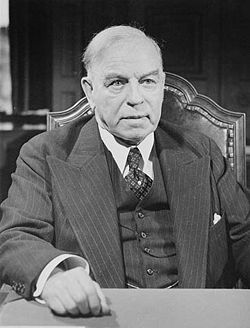| 19th Canadian Parliament | |||
|---|---|---|---|
| Majority parliament | |||
| May. 16, 1940 – Apr. 16, 1945 | |||
 | |||
| Parliament leaders | |||
| Prime minister | William Lyon Mackenzie King Oct. 23, 1935 – Nov. 15, 1948 | ||
| Cabinet | 16th Canadian Ministry | ||
| Leader of the Opposition | Richard Hanson 14 May 1940 – 1 January 1943 | ||
| Gordon Graydon 1 January 1943 – 10 June 1945 | |||
| Party caucuses | |||
| Government | Liberal Party | ||
| Opposition | National Government (Canada) & Conservative Party | ||
| Crossbench | Co-operative Commonwealth Federation | ||
| Social Credit Party | |||
| Liberal-Progressive | |||
| House of Commons | |||
 Seating arrangements of the House of Commons | |||
| Speaker of the Commons | James Allison Glen 16 May 1940 – 5 September 1945 | ||
| Government House leader | Ian Alistair Mackenzie 14 October 1944 – 30 April 1948 | ||
| Members | 245 MP seats List of members | ||
| Senate | |||
| Speaker of the Senate | Georges Parent 9 May 1940 – 14 December 1942 | ||
| Thomas Vien 23 January 1943 – 23 August 1945 | |||
| Government Senate leader | Raoul Dandurand 23 October 1935 – 11 March 1942 | ||
| James Horace King 26 May 1942 – 24 August 1945 | |||
| Opposition Senate leader | Arthur Meighen 22 October 1935 – 16 January 1942 | ||
| Charles Colquhoun Ballantyne 16 January 1942 – 11 September 1945 | |||
| Sovereign | |||
| Monarch | George VI 11 December 1936 – 6 February 1952 | ||
| Governor general | Alexander Cambridge 21 June 1940 – 12 April 1946 | ||
| Sessions | |||
| 1st session 16 May 1940 – 5 November 1940 | |||
| 2nd session 7 November 1940 – 21 January 1942 | |||
| 3rd session 22 January 1942 – 27 January 1943 | |||
| 4th session 28 January 1943 – 26 January 1944 | |||
| 5th session 27 January 1944 – 31 January 1945 | |||
| 6th session 19 March 1945 – 16 April 1945 | |||
| |||

The 19th Canadian Parliament was in session from 16 May 1940, until 16 April 1945. The membership was set by the 1940 federal election on 26 March 1940, and it changed only somewhat due to resignations and by-elections until it was dissolved prior to the 1945 election.
Contents
- List of members
- Alberta
- British Columbia
- Manitoba
- New Brunswick
- Nova Scotia
- Ontario
- Prince Edward Island
- Quebec
- Saskatchewan
- Yukon
- By-elections
- Notes
- References
It was controlled by a Liberal Party majority under Prime Minister William Lyon Mackenzie King and the 16th Canadian Ministry. The Official Opposition was the so-called "National Government" party (the name which the Conservatives ran under in the 1940 election), led in the House by Richard Hanson and Gordon Graydon consecutively as the three successive national leaders of the party, Robert Manion, Arthur Meighen and John Bracken did not have seats in the House of Commons. With the selection of Bracken as national leader in December 1942, the party became known as the Progressive Conservatives.
The Speaker was James Allison Glen. See also List of Canadian electoral districts 1933–1947 for a list of the ridings in this parliament.
There were six sessions of the 19th Parliament.
On December 30, 1941, United Kingdom Prime Minister Winston Churchill addressed the House of Commons and Senate in Centre Block in his "Some chicken! Some neck!" speech. [1]